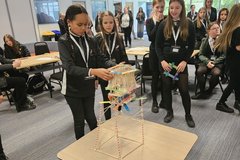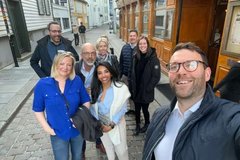With years of experience in international diplomacy and energy, Muzzamil now focuses on corporate strategy, culture and employee satisfaction.
Congratulations on your new role. Senior Vice President of People and Culture has incredible scope in a company that employs some 58,000 people globally. What signal does your promotion give?
Muzzamil Khider ahmed:
Having ‘culture’ in my title shows Baker Hughes’ commitment to providing a positive working environment for its people. As employees, we all have a role to play in culture, but if I can help the organization move its culture in the right direction and have a positive culture at all layers of the organization, that is a legacy worth striving for.

Let’s go back to the beginning of your career. What led you to pursue Masters level studies in international relations and politics at the Université Paris VIII, back in 1999? Where did you think it might take you?
Muzzamil Khider ahmed:
I am originally from Sudan and where I come from parents expect you to become either a doctor or an engineer “I have 2 siblings who are a doctor and an engineer”. But, from a very young age I wanted to be a diplomat; perhaps because my uncle was an ambassador. I decided after I graduated from university that I wanted to pursue further studies in political science and international relations.
I did start my professional career in diplomacy, with UNESCO. After I completed a diplomatic training course in France, I worked in 5 different countries in Europe for a royal family for five years. Part of what I was doing in that role had to do with people, and I really liked that, so I became curious about HR.
My first employer outside diplomacy was Schlumberger (now SLB), where I got a job as HR manager across a group of Eastern Mediterranean and African countries.
Later, you moved to GE which subsequently merged with Baker Hughes. What motivated you and maintained your optimism during those turbulent times?
Muzzamil Khider ahmed:
I joined GE Oil & Gas in 2014 and at that time, the company’s ambitions in the oil and gas space really appealed to me. GE Oil & Gas was made up of acquisitions. When I was brought in, I was told from the very beginning that we wanted to further grow our share of oilfield services. The company’s portfolio was already atypical: compared to other oilfield services companies, we had upstream, downstream and midstream services, and I thought that the future of the company looked great. I was very lucky that a couple of years after I joined, I became part of the due diligence and integration for the merger between Baker Hughes and GE Oil & Gas. It was a great experience.
What have you gained from working at a multinational company such as Baker Hughes?
Muzzamil Khider ahmed:
I enjoy and appreciate being part of a global company. I consider myself a product of my international assignments. I pride myself on having experience in 14 countries, because it has given me a deep understanding of different cultures. This has contributed to the ease with which I can talk to people, interact with people, communicate to people. That really fulfils and satisfies me.
And I'm committed to the overarching company strategy set in 2019. The purpose we have, to lead the energy transition, moving energy forward to provide cleaner and safer energy on a global scale, is completely in line with my own principles – it resonates with me.
At Baker Hughes you are constantly managing the human side of organizational change. What is key to bringing people along, to fostering their enthusiasm for new ways of thinking and working?
Muzzamil Khider ahmed:
Change is a constant in today's world. I think explaining to people why the company needs to change, what is changing and what change means for them, plays a big role. It's true that people might feel uneasy with change, but the moment you explain why it's important and the outcomes we’re working towards, people get on board. I see lots of our people being part of change and wanting to drive the changes that will make our lives better, so my experience of managing change has been more positive than negative.
On a personal level, my journey has been all about change. I lived in Europe for quite some time during and after my studies. Then I returned to the Middle East, which is very different. Subsequently, my wife and I started a family, and we moved to Latin America at a time when we couldn’t even speak Spanish. But I feel that if you are open to change, change becomes easy, it becomes exciting. It’s a mindset.
What is the current most significant organizational challenge for Baker Hughes and how are you navigating that challenge with employees?
Muzzamil Khider ahmed:
The challenge is to lead in providing new energy and to expand our ability to other industries in a progressively cleaner way. Our broad portfolio means we are uniquely placed to achieve these goals and if we can connect the multiple industries we play in, we win. On the workforce side, making sure that our people are properly equipped, that they have the right competencies and confidence to use their skills – this will take us through the change.
In my role, the main challenge is making sure that our people are ready for what's coming. It's about raising awareness of what's happening, understanding how, as an individual, you become part of it, and providing people with the right tools, training and development to be at the forefront of change.
You've talked about how important gender equality is at Baker Hughes in terms of ensuring equal opportunities and equal pay. What benefits will ensue in organizations?
Muzzamil Khider ahmed:
We are very close to that goal! I presented to our board of directors last month and I was able to show that we are closing the average gender pay gap very fast. I hope and anticipate that in 2025 we will not have any gap.
I think we all understand, historically, what led to inequalities became entrenched. But today there's no excuse for not closing the gap and not giving people equal opportunities. I am proud to say that one of the main reasons people decide on joining Baker Hughes is our commitment to diversity and inclusion and the lived experience of that commitment among our employees.

What happens in the workplace when people are treated and rewarded equally?
Muzzamil Khider ahmed:
You get more productivity, more excitement, and people are willing to go the extra mile. When people know they are equally valued, they are happier, and it leads to greater engagement and greater loyalty to their employer. I strongly believe that when we treat people equally, we can develop a positive and stable work environment, even in the face of constant change.
What does inclusion really mean at Baker Hughes?
Muzzamil Khider ahmed:
My analogy for inclusion is ‘inviting everyone to the party’, and I want to ensure that we move from giving that clear invitation, to people feeling that they want to be at the party. It's important that people do that deliberately, for them to say, "I want to be part of it." For me, inclusion also needs to translate to a sense of belonging, where people feel that they can be themselves, be listened to and be respected.
What do you feel are the differences between the reality of a working life and how your children view their prospects of career?
Muzzamil Khider ahmed:
First, my two eldest have very different views of the world. My son, Khalid, is 19 and wants to be a sports analyst. For him, it's all about data that supports well being and performance. My daughter Shahd is 17 and wants to study international law. For her, it's all about the purpose, helping people access equal opportunities. Spending time with them makes me very optimistic about the future.
We tend to worry about the amount of information children and young adults have access to, but I think that on the positive side it's raising their awareness. When I was their age, I don't recall thinking about the things they think about. My youngest, Yasmin, is nine years old and she was telling me a couple of days ago that I should reduce the amount of meat I eat because it's impacting the planet.
At work, I like what the younger generation is inspiring us to drive and commit to. I encourage all our leaders at Baker Hughes to take on reverse mentorship, that is to have a young mentor who gives us their perspective on what’s going on in industry, in society and in the workplace. Lorenzo Simonelli, our chairman, president and CEO, has a young mentor, as do most of the executive team, and it seems these younger employees even get some benefit from talking to us and learning from our experiences. It’s good!
Sign up now
Subscribe to stay up to date on the latest innovations and people shaping the future of our industry.




